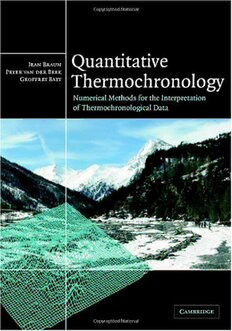Download Quantitative Thermochronology: Numerical Methods for the Interpretation of Thermochronological Data PDF Free - Full Version
Download Quantitative Thermochronology: Numerical Methods for the Interpretation of Thermochronological Data by Jean Braun, Peter van der Beek, Geoffrey Batt in PDF format completely FREE. No registration required, no payment needed. Get instant access to this valuable resource on PDFdrive.to!
About Quantitative Thermochronology: Numerical Methods for the Interpretation of Thermochronological Data
Thermochronology, the study of the thermal history of rocks, enables us to quantify the nature and timing of tectonic processes. Quantitative Thermochronology is a robust review of isotopic ages, and presents a range of numerical modeling techniques to allow the physical implications of isotopic age data to be explored. The authors provide analytical, semi-analytical, and numerical solutions to the heat transfer equation in a range of tectonic settings and under varying boundary conditions. They then illustrate their modeling approach built around a large number of case studies. The benefits of different thermochronological techniques are also described. Computer programs on an accompanying website at www.cambridge.org/9780521830577 are introduced through the text and provide a means of solving the heat transport equation in the deforming Earth to predict the ages of rocks and compare them directly to geological and geochronological data. Several short tutorials, with hints and solutions, are also included.
Detailed Information
| Author: | Jean Braun, Peter van der Beek, Geoffrey Batt |
|---|---|
| Publication Year: | 2006 |
| ISBN: | 9780511161711 |
| Pages: | 272 |
| Language: | English |
| File Size: | 2.137 |
| Format: | |
| Price: | FREE |
Safe & Secure Download - No registration required
Why Choose PDFdrive for Your Free Quantitative Thermochronology: Numerical Methods for the Interpretation of Thermochronological Data Download?
- 100% Free: No hidden fees or subscriptions required for one book every day.
- No Registration: Immediate access is available without creating accounts for one book every day.
- Safe and Secure: Clean downloads without malware or viruses
- Multiple Formats: PDF, MOBI, Mpub,... optimized for all devices
- Educational Resource: Supporting knowledge sharing and learning
Frequently Asked Questions
Is it really free to download Quantitative Thermochronology: Numerical Methods for the Interpretation of Thermochronological Data PDF?
Yes, on https://PDFdrive.to you can download Quantitative Thermochronology: Numerical Methods for the Interpretation of Thermochronological Data by Jean Braun, Peter van der Beek, Geoffrey Batt completely free. We don't require any payment, subscription, or registration to access this PDF file. For 3 books every day.
How can I read Quantitative Thermochronology: Numerical Methods for the Interpretation of Thermochronological Data on my mobile device?
After downloading Quantitative Thermochronology: Numerical Methods for the Interpretation of Thermochronological Data PDF, you can open it with any PDF reader app on your phone or tablet. We recommend using Adobe Acrobat Reader, Apple Books, or Google Play Books for the best reading experience.
Is this the full version of Quantitative Thermochronology: Numerical Methods for the Interpretation of Thermochronological Data?
Yes, this is the complete PDF version of Quantitative Thermochronology: Numerical Methods for the Interpretation of Thermochronological Data by Jean Braun, Peter van der Beek, Geoffrey Batt. You will be able to read the entire content as in the printed version without missing any pages.
Is it legal to download Quantitative Thermochronology: Numerical Methods for the Interpretation of Thermochronological Data PDF for free?
https://PDFdrive.to provides links to free educational resources available online. We do not store any files on our servers. Please be aware of copyright laws in your country before downloading.
The materials shared are intended for research, educational, and personal use in accordance with fair use principles.

